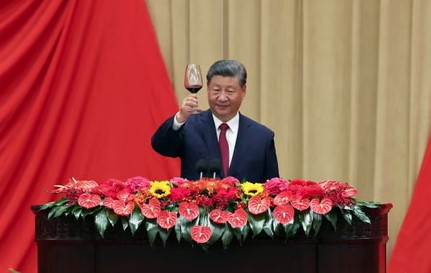In one of the most dramatic political shake-ups in decades, the Chinese Communist Party (CCP) has expelled nine of its most senior military generals. China’s Ministry of Defense made the announcement, revealing that all nine men faced accusations of committing serious financial crimes. They were also accused of violating party discipline.
Chinese Communist Party Launches Historic Military Crackdown
This large-scale expulsion has shocked observers both inside and outside China. Many of the generals were not just senior military officers—they were also members of the Chinese Communist Party’s Central Committee, the powerful group that helps decide the country’s key policies. Most of them held three-star ranks, making them part of the top military leadership in the nation.
The defense ministry said in a statement that these officials seriously violated party discipline and committed serious duty-related crimes involving an extremely large amount of money. The statement described their violations as extremely serious in nature and causing extremely detrimental consequences.
Rare enforcement: U.S. diplomat ousted for romantic involvement with Chinese national
The ministry expelled all nine generals from both the Chinese Communist Party and the military and confirmed that military prosecutors will now charge them under military law. Officials and observers describe the move as one of the most far-reaching anti-corruption operations in the history of China’s armed forces.
The Chinese Communist Party has a long history of conducting internal disciplinary actions, but this latest move stands out for the number of top-ranking officers involved and the timing of the decision, which coincides with a major political meeting in Beijing.
Chinese Communist Party Expels High-Ranking Generals
The list of expelled officials reads like a who’s who of China’s top military leadership. President Xi Jinping, the leader of the Chinese Communist Party, chairs the Central Military Commission (CMC), the nation’s highest defense authority, which includes several key figures among them.
The nine officials named in the statement are:
He Weidong – Vice-chairman of the Central Military Commission (CMC)
Miao Hua – Director of the CMC’s Political Work Department
He Hongjun – Executive Deputy Director of the CMC’s Political Work Department
Wang Xiubin – Executive Deputy Director of the CMC’s Joint Operations Command Center
Lin Xiangyang – Commander of the Eastern Theatre Command
Qin Shutong – Political Commissar of the Army
Yuan Huazhi – Political Commissar of the Navy
Wang Houbin – Commander of the Rocket Forces
Wang Chunning – Commander of the Armed Police Force
Among them, He Weidong was the most senior and prominent figure. As the vice-chairman of the Central Military Commission, he was effectively the second-highest-ranking officer in China’s military—outranked only by President Xi Jinping himself, who leads the Chinese Communist Party.
Stanford to Spycraft? Explosive Allegations Link Chinese Students to Intelligence Ops
He Weidong was also a member of the Politburo, the CCP’s top decision-making body. His inclusion in the list makes him the first sitting Politburo member to be investigated under Xi’s leadership. His last public appearance was in March, and his long absence had already fueled speculation that he was being investigated.
The inclusion of top commanders from the Rocket Forces, Navy, Army, and Armed Police shows that the Chinese Communist Party’s crackdown reaches across multiple branches of the nation’s defense system. The presence of both political commissars and field commanders on the list indicates that the investigation is targeting both administrative and operational divisions within the military.
Political Context and Impact on Party’s Image
The Chinese government said the expulsions were part of an ongoing anti-corruption campaign in the military. In recent years, the Chinese Communist Party (CCP) under President Xi has stressed “clean governance” and strict discipline among officers to eliminate corruption and strengthen loyalty to its central leadership.
However, analysts note that the timing is crucial. The action came just before a major Communist Party plenum, where the Central Committee will discuss China’s next economic plan and select new members. Some observers believe that beyond corruption, the move also serves as a political purge to remove dissent and reinforce the Chinese Communist Party’s authority over the People’s Liberation Army (PLA), which serves the party rather than the state.
The defense ministry hailed the crackdown as a “significant achievement” in its anti-corruption drive, portraying it as proof of the Chinese Communist Party’s determination to enforce discipline. In recent years, several senior officers, especially from the Rocket Forces, have faced investigation or dismissal.
The ministry noted that the crimes involved “an extremely large amount of money” and caused “extremely detrimental consequences,” though no details were released. The mass expulsion of nine top military leaders marks one of China’s largest purges since the 1990s, showcasing the Chinese Communist Party’s firm grip on the military and its demand for absolute loyalty.

